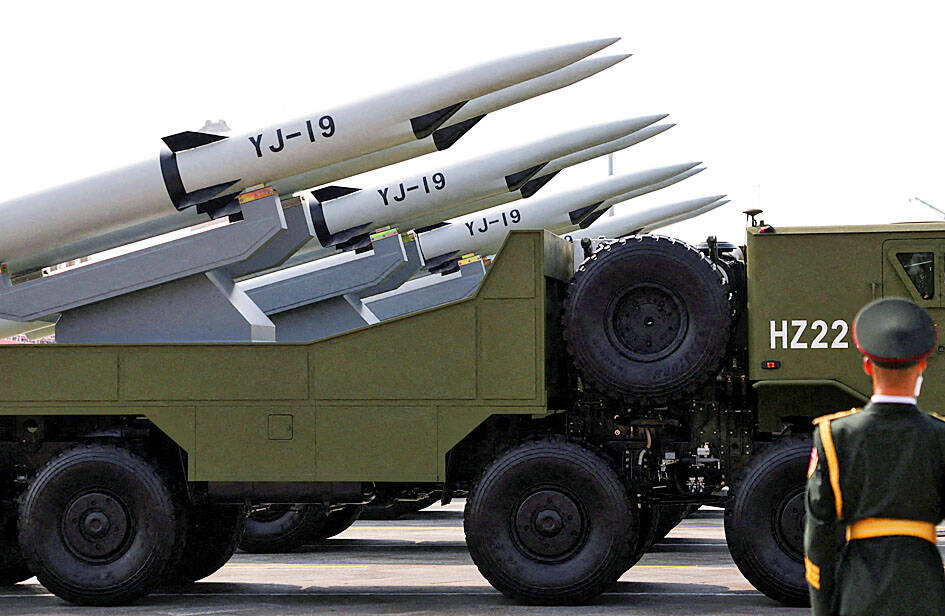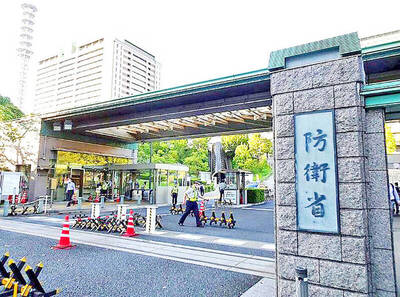Taiwanese military analysts yesterday called China’s so-called “Victory Day” military parade a show of force targeting Taiwan, adding that the visible disarray of the Chinese People’s Liberation Army (PLA) had undermined that message.
Chinese President Xi Jinping (習近平) said at the event yesterday that Beijing would accelerate its efforts to build a world-class military, protect sovereignty and territorial integrity, and provide strategic support for the “great revival of the Chinese nation.”
Su Tzu-yun (蘇紫雲), a researcher at the state-run Institute for National Defense and Security Research (INDSR), said that rather than displaying China’s might, the parade exposed an embarrassing leadership vacuum at the PLA.

Photo: Reuters
The commander of the PLA Central Theater Command customarily served as the parade’s master of ceremonies, yet the role fell to Lieutenant General Han Shengyan (韓勝延), the head of the Central Theater Command Air Force, Su said.
The downgrading of the role likely demonstrates the chaos wrought by ongoing purges among the PLA’s top brass, he said.
Although PLA showcased an array of next-generation weapon systems, including autonomous uncrewed aerial vehicle swarm technology and hypersonic missiles, older Chinese weapons remain the gravest threat to Taiwan, he said.
China unveiled the Dongfeng-61 intercontinental ballistic missiles featuring multiple independently targetable re-entry vehicles and deployable decoys, Julang-3 submarine-launched ballistic missiles that extend the effective range and decreased the observability of Chinese submarines, and Hungchi-29 air defense systems capable of intercepting satellites and hostile missiles, he said.
These systems together formed a strategic deterrence capability, he said.
Operationally, the PLA continues to pursue anti-access/area denial capabilities (A2/AD) in the form of the carrier-based Xian KJ-600 airborne early warning and control systems, and Shenyang J-35 stealth fighter bombers to be deployed with the planned aircraft carrier Fujian, he said.
Chinese armed forces additionally displayed the YJ-15, YJ-17, YJ-19 and YJ-20 supersonic and hypersonic anti-ship missiles to complement its A2/AD capabilities at sea, Su said.
The PLA’s robot wolves, uncrewed tanks, laser weapons, anti-aircraft artillery vehicles and FH-97 wingmen drones for the Chengdu J-20 stealth fighters have created new tactical capabilities, he said.
Yet, the Taiwanese military should continue to focus on intercepting Chinese military cargo aircraft and transport ships in the Taiwan Strait, which is a matter concerning air defense capabilities, he said.
Taiwan’s most urgent military requirements are to obtain enough air defense systems that fully constitute short, medium and long-range mobile capabilities to deal with Chinese offensive missiles and drones, he said.
The nation does not lack anti-surface vessel capabilities due to an abundance of missiles in the military’s stockpiles, Su said.
The government must oversee the various drone development programs in the private sector to form the full spectrum of tactical and operational capabilities, he said.
INDSR researcher Shen Ming-shih (沈明室) expressed skepticism over the YJ-family of missiles, saying that they bore an uncanny resemblance to similar Russian weapons.
Unlicensed copies of Russian weapons are likely to possess between 70 and 80 percent of the original’s capabilities, he said, adding that their unveiling at the parade could be a North Korean-style publicity stunt.
The J-35 jets and Fujian aircraft carrier are no longer news, but their actual deployment has been slow and long in coming, suggesting the technologies utilized are not mature, he said.
Russia’s vaunted hypersonic weapons have been repeatedly shot down by US-made Patriot missile systems in Ukraine, casting doubt on China’s ability to produce such advanced arms as a latecomer, Shen said.

LOOKING NORTH: The base would enhance the military’s awareness of activities in the Bashi Channel, which China Coast Guard ships have been frequenting, an expert said The Philippine Navy on Thursday last week inaugurated a forward operating base in the country’s northern most province of Batanes, which at 185km from Taiwan would be strategically important in a military conflict in the Taiwan Strait. The Philippine Daily Inquirer quoted Northern Luzon Command Commander Lieutenant General Fernyl Buca as saying that the base in Mahatao would bolster the country’s northern defenses and response capabilities. The base is also a response to the “irregular presence this month of armed” of China Coast Guard vessels frequenting the Bashi Channel in the Luzon Strait just south of Taiwan, the paper reported, citing a

A total lunar eclipse, an astronomical event often referred to as a “blood moon,” would be visible to sky watchers in Taiwan starting just before midnight on Sunday night, the Taipei Astronomical Museum said. The phenomenon is also called “blood moon” due to the reddish-orange hue it takes on as the Earth passes directly between the sun and the moon, completely blocking direct sunlight from reaching the lunar surface. The only light is refracted by the Earth’s atmosphere, and its red wavelengths are bent toward the moon, illuminating it in a dramatic crimson light. Describing the event as the most important astronomical phenomenon

ENHANCING DETERRENCE: Stationing the missiles in Kyushu would allow Japan to cover waters near Taiwan and China’s coastal areas without any logistical difficulties Japan is to deploy extended-range anti-ship missiles at a Ground Self-Defense Force base in Kumamoto to bolster its defenses, the Yomiuri Shimbun reported on Saturday. The upgraded Type 12 surface-to-ship missile, with a range of more than 1,000km, would be capable of striking targets in the Taiwan Strait and along China’s coast. Originally limited to a few hundred kilometers, the Type 12 was recently modernized ahead of schedule. Deployment, initially slated for next year, has been accelerated after the upgrade was completed sooner than expected, the newspaper said. Stationing the missiles in Kyushu would allow Japan to cover waters near Taiwan and

The presence of Taiwanese politicians at China’s military parade tomorrow would send the wrong message to Beijing and the international community about Taiwan’s sovereignty and democracy, a national security official said yesterday. China is to hold the parade tomorrow to mark the 80th anniversary of Japan’s surrender in World War II. By bringing together leaders of “anti-West” governments such as Russia, North Korea, Iran and Belarus, the parade aims to project a symbolic image of an alliance that is cohesive and unbending against Western countries, the national security official said, speaking on condition of anonymity. Former Chinese Nationalist Party (KMT) chairwoman Hung Hsiu-chu